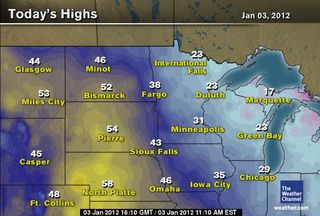Will Weather Affect Who Wins the Iowa Caucus?

Iowa Republicans will caucus this evening (Jan. 3), selecting their preferred nominee for U.S. President after months of intense campaigning in the state. With just a few hours left until decision time, and with leading candidates Mitt Romney, Ron Paul and Rick Santorum in a dead heat, feverish media speculation is leaving no stone unturned as to what factors could affect the caucus' outcome.
Even the weather has been scrutinized.
According to Weather.com, polling experts believe Rep. Ron Paul of Texas would benefit most from poor weather because of the high level of commitment of his supporters. Paul's diehard fans will turn out regardless of weather conditions, the thinking goes, while less-passionate supporters may decide at the last minute to ditch their favorite candidate and instead cast their vote for a cozy evening indoors.
On the other hand, good weather in Iowa this evening could mean a win for former Massachusetts governor Mitt Romney, pundits say. Romney's slight lead in the polls would give him the upper hand if enough voters turn out; his statistical advantage disappears if apathetic voters stay home.
"That's where Mitt is at a disadvantage, he doesn't have the devotion," former Republican presidential candidate Mike Huckbee said on Fox News, Sunday (Jan. 1).
So, what's the forecast? Meteorologists at Weather.com predict balmy weather, and "no major winter storm is anticipated to interfere with travel to/from the caucus locations Tuesday evening." Furthermore, temperatures will be tame compared with an average January evening, "as the coldest air from earlier in the week retreats."
That forecast would seem to favor Romney.
Sign up for the Live Science daily newsletter now
Get the world’s most fascinating discoveries delivered straight to your inbox.
However, some political experts believe all speculation regarding the weather tonight is fruitless. Studies show weather does influence voter turnout in the general election, with every inch of rain decreasing the turnout by almost a percentage point, but political scientist Brad Gomez of Florida State University says the same does not usually hold true of caucuses. Attending a caucus is "a very time-intensive event, and the turnout is usually very low," Gomez told the New York Times. "It's very unlikely that precipitation would have much of an effect."
It could be that the 100,000 voters expected to turn out in Iowa tonight — a dedicated 3 percent of the state's total population — will likely stick with their plan come rain, snow or shine.
Follow Natalie Wolchover on Twitter @nattyover. Follow Life's Little Mysteries on Twitter @llmysteries, then join us on Facebook.
Natalie Wolchover was a staff writer for Live Science from 2010 to 2012 and is currently a senior physics writer and editor for Quanta Magazine. She holds a bachelor's degree in physics from Tufts University and has studied physics at the University of California, Berkeley. Along with the staff of Quanta, Wolchover won the 2022 Pulitzer Prize for explanatory writing for her work on the building of the James Webb Space Telescope. Her work has also appeared in the The Best American Science and Nature Writing and The Best Writing on Mathematics, Nature, The New Yorker and Popular Science. She was the 2016 winner of the Evert Clark/Seth Payne Award, an annual prize for young science journalists, as well as the winner of the 2017 Science Communication Award for the American Institute of Physics.

